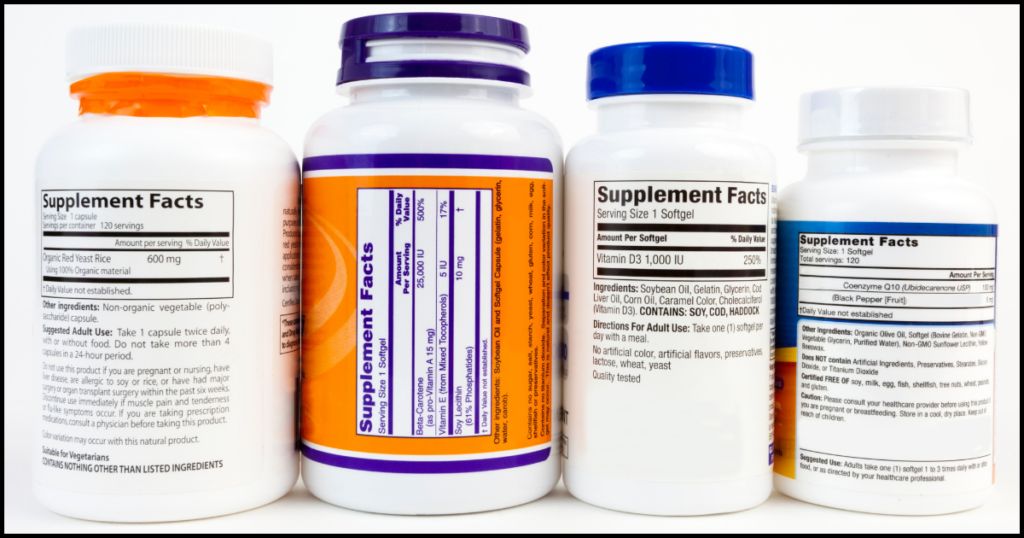Author: Alena N. Arounpradith, PharmD & MBA Candidate, Oregon State University
Supplements are everywhere these days. From TikTok influencers hyping creatine powder to patients asking about mushroom extracts, people are eager to take control of their health. And who’s better positioned to help than pharmacists?
Pharmacists can guide patients in navigating supplements, vitamins, and lifestyle choices to support proactive wellness. With holistic healthcare on the rise, bridging traditional medicine with proactive wellness has never been more crucial. At Cascadia Pharmacy Group, our pharmacies are leading the charge. Red Cross Drug Store in La Grande, Oregon, boasts a Nutrition Center, while Madison Park Pharmacy & Wellness Center in Seattle offers personalized consultations with naturopaths and herbalists.
This article provides pharmacists with the tools to navigate this trend, empowering them to guide patients toward well-informed health choices.
Popular Supplements in Today’s Market
Many patients turn to supplements like Omega-3s, Vitamin D, and multivitamins for overall wellness. Social media plays a significant role in shaping these trends. Platforms like Instagram, YouTube, and TikTok drive wellness trends, often leading patients to seek advice from pharmacists after seeing influencer recommendations.

However, social media is a double-edged sword. While it raises awareness, it can also spread misinformation. A University of Chicago study found nearly 44% of health-related TikTok videos contained inaccurate information, often from non-medical influencers.1
Laura Sorensen, front-end retail manager at Madison Park Pharmacy & Wellness Center, shares, “Trends often emerge through TikTok—like chlorophyll supplements in 2023. These highlight the need for educating patients and encouraging them to consult trusted healthcare providers.”
For pharmacists, staying informed on trends isn’t just helpful—it’s essential for providing accurate guidance in an age of information overload.
The Importance of Vitamin Education
Pharmacists as Educators
The supplement aisle can overwhelm patients with endless flashy labels and bold claims. Pharmacists play a key role in demystifying these products, helping patients view supplements as tools for wellness rather than magic fixes.
Darcy Blackman, a pharmacist and nutrition center specialist at Red Cross Drug Store, states, “As pharmacists, we identify patients’ specific health concerns and potential deficiencies. Foundational supplements like Vitamin D with K2 and high-quality multivitamins are often the starting point.”
Matt Binder of Madison Park Pharmacy adds, “We align supplement recommendations with patients’ needs. For example, we suggest coenzyme Q10 for patients on statins. Our team includes naturopaths, herbalists, and experienced staff. If a patient takes Ambien, we assess how supplements like melatonin might interact with their regimen. Our goal is to empower informed decisions through expert guidance.”

Safety and Quality: The Non-Negotiables
Not all supplements are equal. Pharmacists can help patients navigate this complex landscape. The Dietary Supplement Health and Education Act (DSHEA) of 1994 regulates supplements but allows flexibility, placing responsibility for safety and labeling on manufacturers.
Many of our pharmacies, such as Madison Park Pharmacy and Red Cross Drug Store, steer patients toward brands with third-party certifications like USP or NSF. Darcy explains, “We ensure every product undergoes third-party testing for authenticity. Some private-label brands substitute ingredients like rice powder for echinacea—a breach of trust. We prioritize brands with minimal fillers, clinical research, and solid reputations.”
Red Cross Drug Store stocks professional-grade brands with proven safety and efficacy. “Clinical experience and patient feedback reinforce our confidence in these brands,” Darcy adds.

Potential Risks You Can’t Ignore
While vitamins and supplements can play a valuable role in supporting health, they are not without risks. Pharmacists play a crucial role in identifying and mitigating these risks. By reviewing a patient’s medication and supplement regimen, pharmacists use their expertise and resources to flag potential interactions and provide guidance on safe combinations.
Facts and Comparisons is one of the drug referential resources that can be used to identify potential drug-supplement interactions. The website Mytavin is another recommended resource that pharmacists can use to identify which nutrients a specific medication may deplete, enabling them to offer tailored supplement recommendations when necessary.
Common Myths (and the Truths Behind Them)
Clearing misconceptions is essential:
- “Multivitamins cover everything.” While they can help fill nutritional gaps, they aren’t a substitute for a balanced diet.
- “Natural means safe.” Just because something is plant-based doesn’t mean it’s risk-free. Think of poison ivy—it’s natural, but not something you want to eat!
- “Supplements can cure diseases.” Supplements support health but aren’t a quick fix for serious medical conditions. Be honest with patients about realistic expectations.
When patients bring up their supplement routines or ask questions during a consult, it’s the perfect opportunity for us to step in as their wellness coaches. By providing evidence-based advice and helping them avoid misconceptions, we can ensure they make the best choices for their health.
Laura explains, “When patients bring in information from social media or online sources, we carefully assess the claims. The FDA prohibits supplements from making definitive statements like ‘cure’ or ‘treats,’ and products making such claims are often from less reputable sources. Our goal is to guide patients toward evidence-based options and away from misleading or unsupported claims, ensuring their safety and trust in our recommendations.”
Darcy adds, “I outline consequences of using low-quality or poorly dosed supplements. Sharing research and clinical experiences helps dispel myths.”
Lifestyle Considerations
Supplements enhance but don’t replace a healthy lifestyle. Pharmacists can emphasize the foundation of wellness: a balanced diet, regular exercise, adequate sleep, and stress management. Supplements address specific needs, like filling dietary gaps for vegans needing Vitamin B12 or lactose-intolerant patients requiring calcium.

Dietary restrictions can significantly influence supplement choices. Laura explains, “We ask about sensitivities, often uncovering dietary restrictions. Most of our allergen-free supplements cater to these needs, and alternatives like vegan Vitamin D are available. Most of the supplements we stock are free from common allergens, and any allergenic ingredients are clearly listed on the label.”
Life stages also matter, as aging adults, pregnant women, or those with chronic conditions may require additional nutrients. By personalizing recommendations based on each patient’s unique situation, we can ensure supplements are used effectively and safely, helping patients achieve their health goals.
Conclusion
Pharmacists are uniquely positioned to guide patients toward better health by educating and empowering them. Our role extends beyond dispensing prescriptions—we’re key players in proactive health strategies. Encouraging patients to see supplements as part of a larger wellness puzzle fosters a more holistic approach.
Darcy shares one of her favorite stories, “A regular patient had bowel problems that made it difficult to leave her house and wanted to travel with her family to Europe. We worked on a protocol and got her to a much better place. She was able to have a successful trip with her family to Europe! She had also been showing signs of dementia, so we started her on a supplement called Prodrome Neuro Plasmalogen. Her memory recall and conversation fluidity improved back to normal and her bowel issues improved dramatically. She is now a lively 75-year-old, who we enjoy interacting with every time she visits our pharmacy.”

As pharmacists and wellness advisors, we play a vital role in empowering patients to make informed decisions about their health. By guiding them toward safe, effective supplements and a balanced lifestyle, we help them achieve better wellness outcomes. At pharmacies like Red Cross Drug Store or Madison Park Pharmacy & Wellness Center, patients can trust us to provide expert advice for their healthcare journey.
Matt emphasizes, “Pharmacies that embrace patients’ growing focus on personal health will thrive. Staying informed about supplement interactions ensures the best care.”
Remember, you’re not just filling prescriptions—you’re a wellness advocate, a guide, and sometimes even a coach. Embrace this role, and you’ll not only help patients manage their medications but also empower them to take charge of their health, one informed decision at a time.
Call to Action
Making this part of your practice is easier than you think. Here are a few tips to get you started:
- Start small: Bring up supplements during consultations. Resources like Living a Healthier Life by Darcy Blackman can build confidence.
- Stay curious: Keep learning about trends, products, and evidence-based practices.
- Make it relatable: Offer simple, practical advice patients can easily apply.
1Dimitroyannis, N., et al. (2024, March 19). Health information on TikTok: The good, the bad, and the ugly. University of Chicago Biological Sciences Division. https://biologicalsciences.uchicago.edu/news/health-information-tiktok

